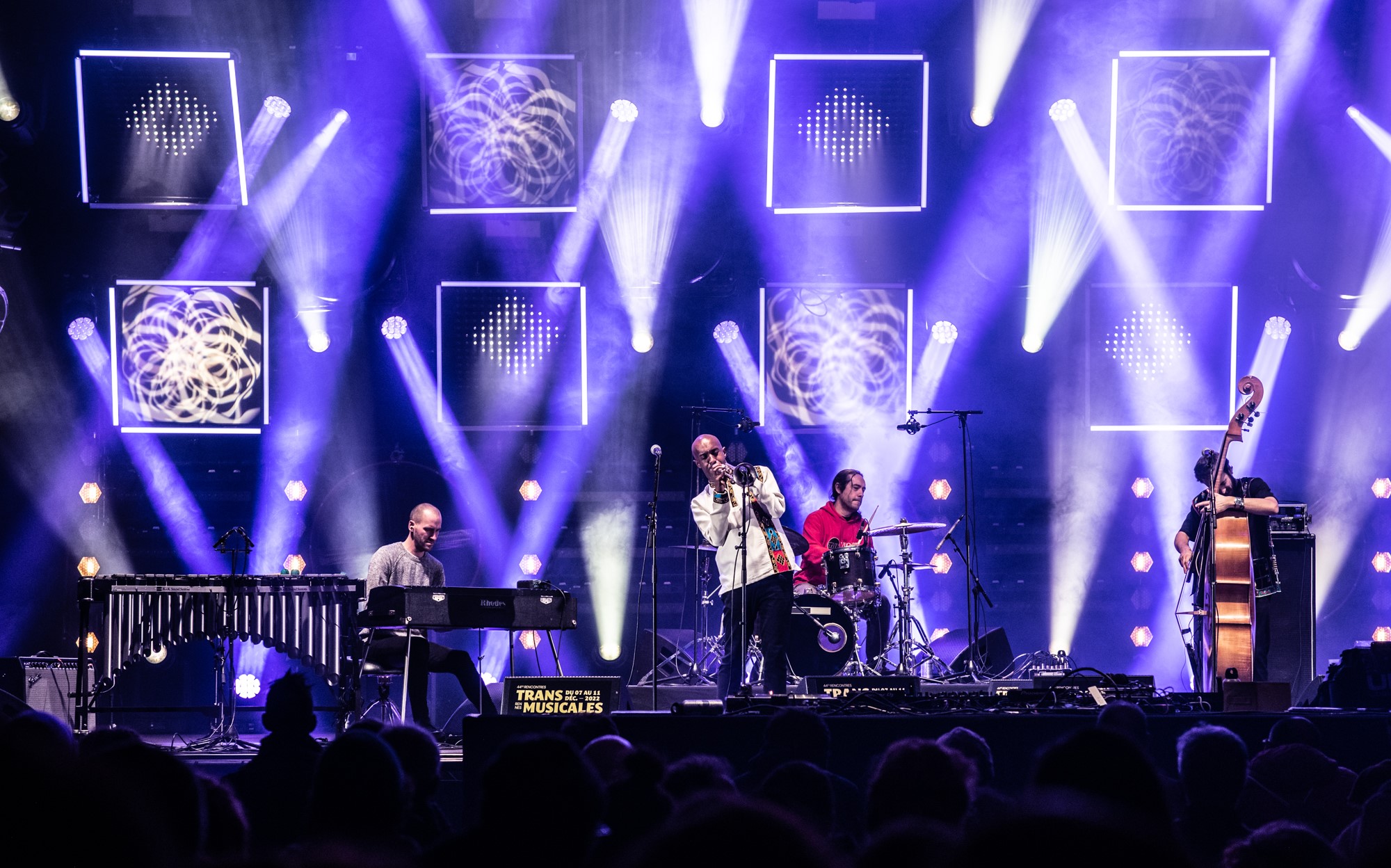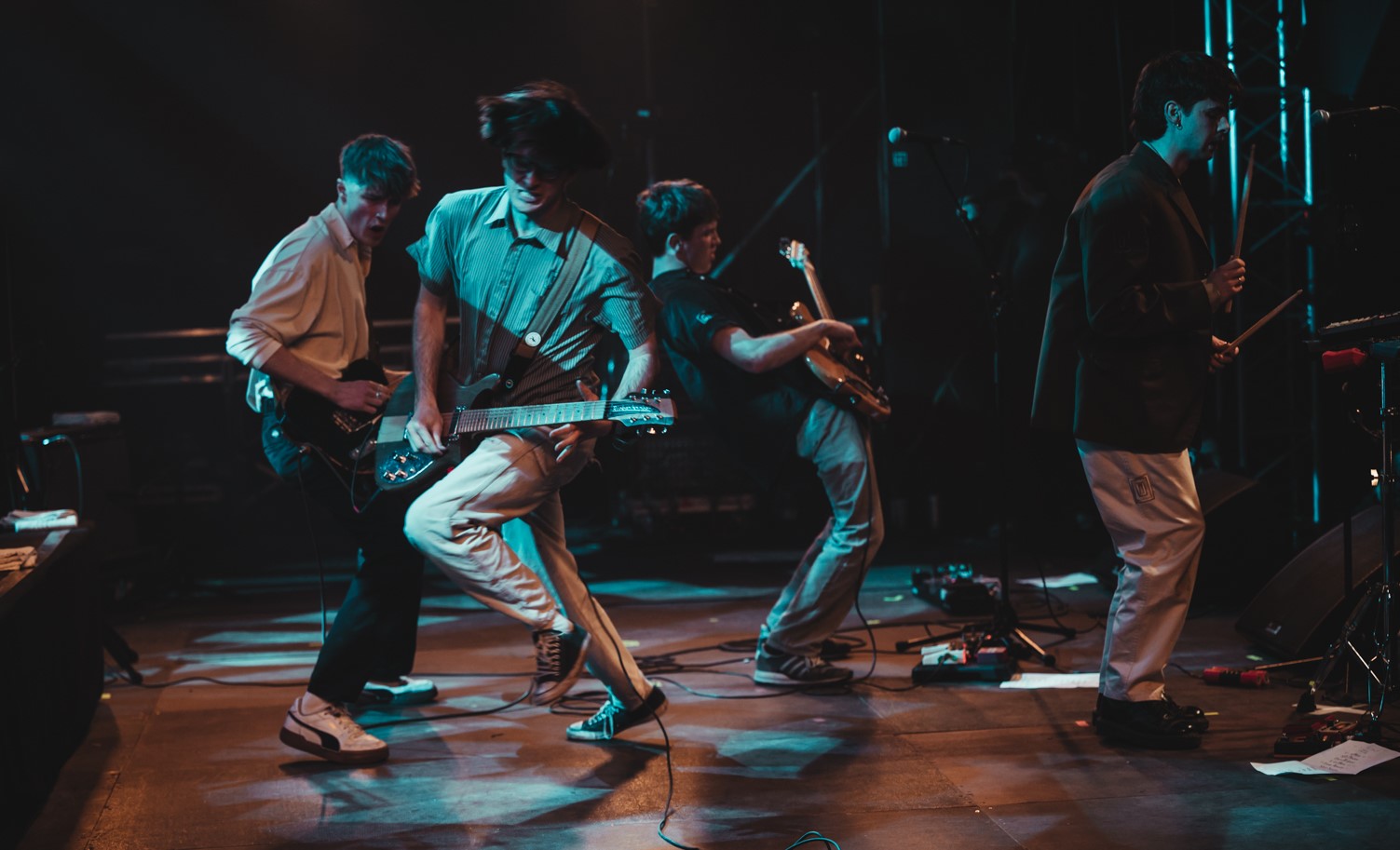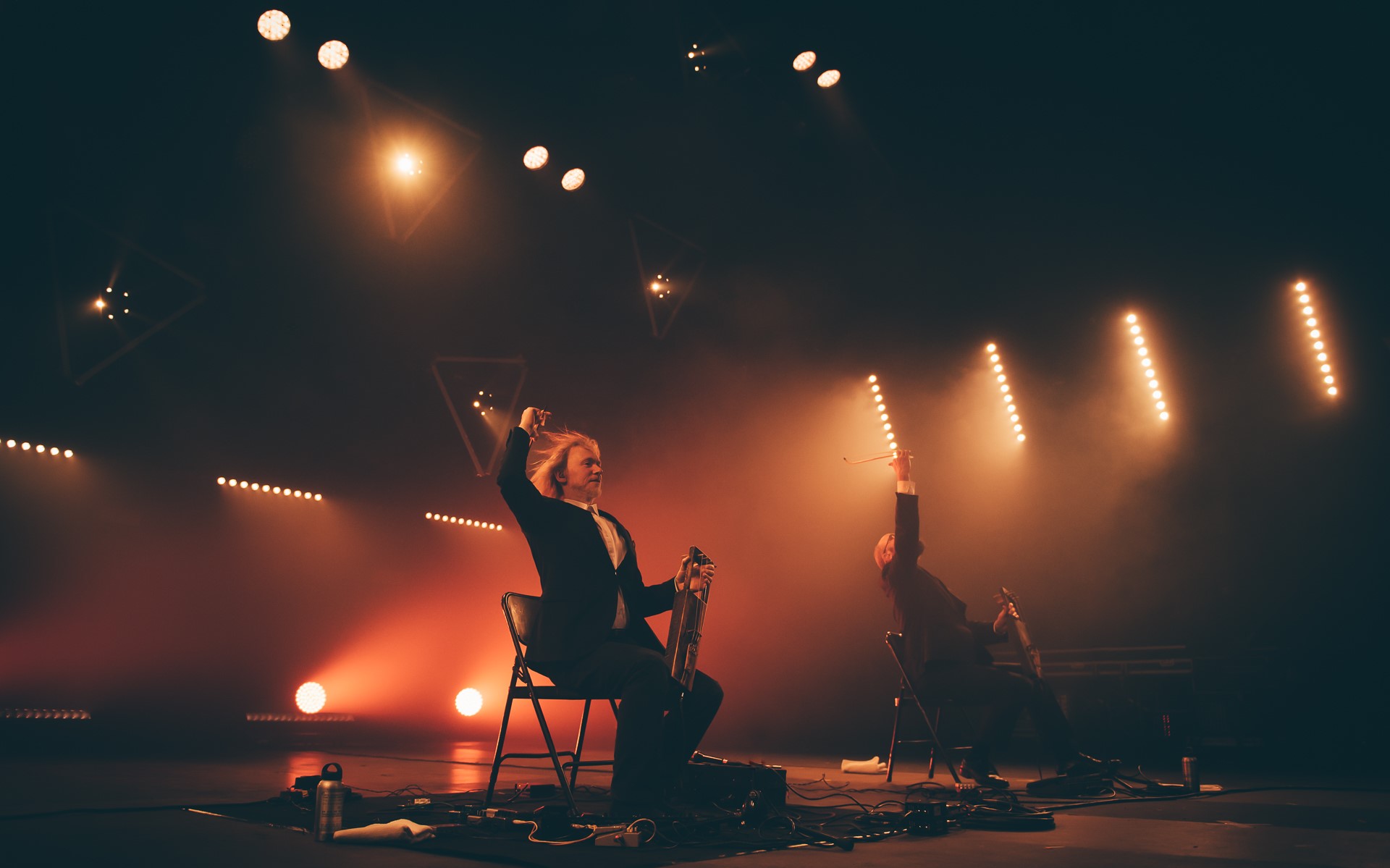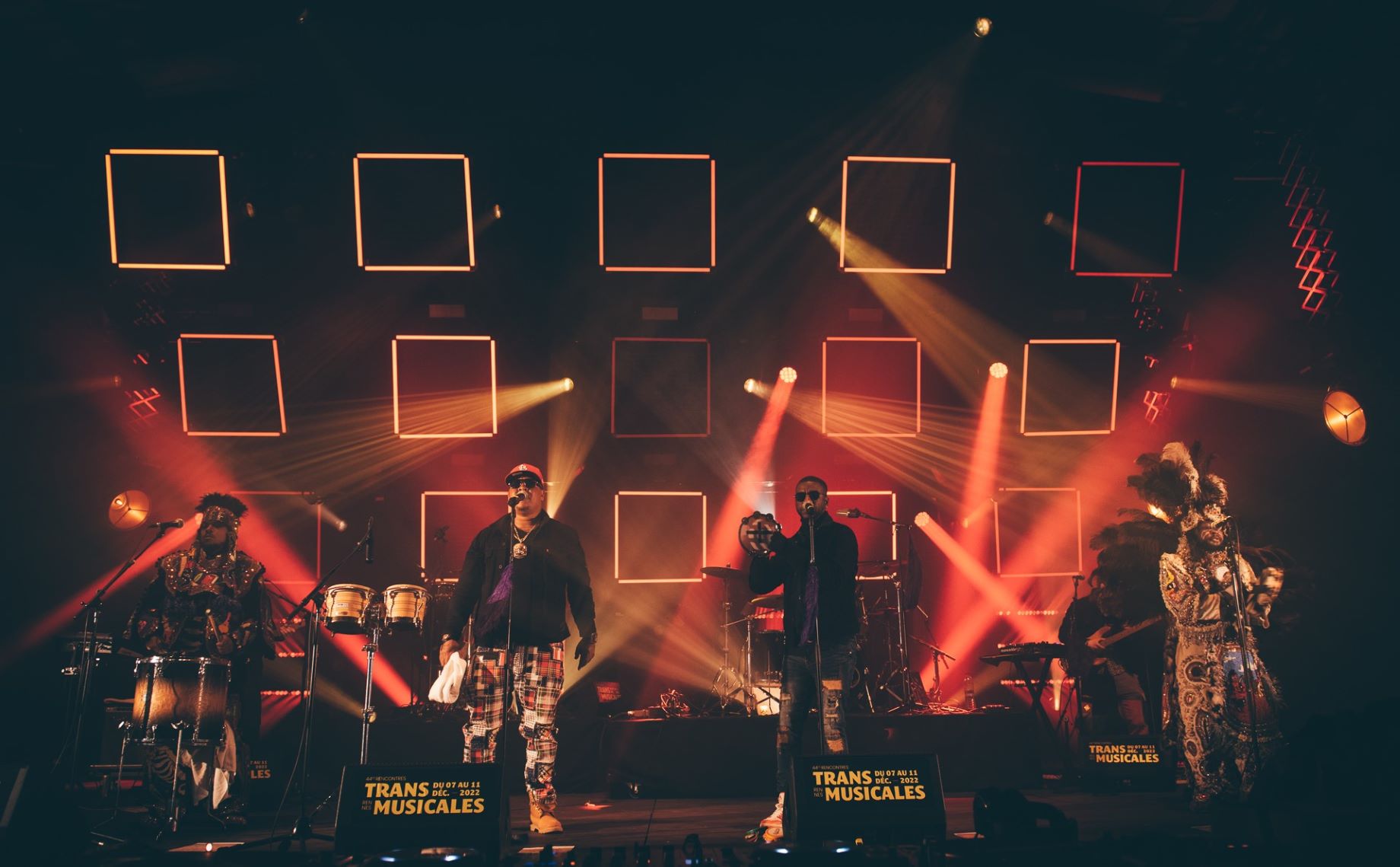Trans Musicales Festival 2022 review - vibrant eclecticism rules in Rennes | reviews, news & interviews
Trans Musicales Festival 2022 review - vibrant eclecticism rules in Rennes
Trans Musicales Festival 2022 review - vibrant eclecticism rules in Rennes
Two days of vanguard global sounds in gigantic, decorated warehouse spaces

It’s Friday night and I’ve finally arrived at 43-year-old French music festival institution Trans Musicales. Due to some dreadful nonsense, it’s taken a 12-hour train journey, two baguettes, one short Stephen King novel, six large beers, a tumbler of Bourbon, and one shuttlebus to place me at the Parc Expo, a series of giant airport hangars that house the majority of musical activity (although there’s a smattering of earlier events in Rennes itself).
The music runs from 9.00 pm-ish through to shortly before dawn and Trans Musicales is renowned for ensuring that the nearly 60,000 attendees are dipped into the unexpected and the upcoming. There are British bands here but the overall vibe is very European, so that indie rocking and electronic barracking sit next to a plethora of Afro-futurism.
 On which note, the first act I catch is Paris-based US jazzer Hermon Mehari (pictured left) who focuses on the Eritrean-flavoured sounds of his recent Asmara album. Clad in white, he jives to a solid groove laid down by his keyboard-player. At his left, wearing a robe-like white dress, Eritrean singer Dehab Fatinga adds another dimension to the proceedings, Mehari’s trumpet circling her vocals, the whole ensemble lit by a backdrop of glow-light orange squares.
On which note, the first act I catch is Paris-based US jazzer Hermon Mehari (pictured left) who focuses on the Eritrean-flavoured sounds of his recent Asmara album. Clad in white, he jives to a solid groove laid down by his keyboard-player. At his left, wearing a robe-like white dress, Eritrean singer Dehab Fatinga adds another dimension to the proceedings, Mehari’s trumpet circling her vocals, the whole ensemble lit by a backdrop of glow-light orange squares.
It's pleasant but I’m after more raucous fare, which I hope to find in Hall 3, another gigantic space, made dream-like by the simple expedient of multiple disco balls high up, casting their spinning snowflakes of light all around. Here, young Brighton five-piece Porchlight are playing. Their set exudes rampant energy, well-caught by Élodie Le Gall’s photo (below right), and their music has a skronky post-punk spikiness.
 They look – and sound a little – like a band who’d have been signed to Factory Records circa 1981, their frontman, stood at a station of percussion and electronic effects, is styled midway between classic Scouser and white-trousered 1920s playboy. Akin, in some ways, to fellow Brighton outfit Squid, the jaggedness of long-lost indie cacophonists Stump and the tricky funk of Talking Heads are somewhere in there, but also the musical perversity of the more outré Seventies prog rock. I could have done with less of the latter but, nonetheless, the take-no-prisoners fieriness with which Porchlight attack is impressive.
They look – and sound a little – like a band who’d have been signed to Factory Records circa 1981, their frontman, stood at a station of percussion and electronic effects, is styled midway between classic Scouser and white-trousered 1920s playboy. Akin, in some ways, to fellow Brighton outfit Squid, the jaggedness of long-lost indie cacophonists Stump and the tricky funk of Talking Heads are somewhere in there, but also the musical perversity of the more outré Seventies prog rock. I could have done with less of the latter but, nonetheless, the take-no-prisoners fieriness with which Porchlight attack is impressive.
Occasionally I come into one of these hangars when a band has finished and the DJ is playing. This can be odd as the crowd thins out to almost nothing and the iciness of the weather outside starts to make its present felt. Such is not the case in Hall 9, however, where (tomorrow night) techno DJs Birrd and Vanille hold the ravier elements in place all night. Overall, Trans Musicales have done a decent job transforming these vast industrial warehouse spaces, especially the central hub which even has a cod-rustic feel, as well as bars selling decent beer, wine and spirits instead of the usual big money brand-franchised crap.
There is an outside area between arenas called the Place des Fêtes where, each night, despite Antarctic temperatures, local punks Dalle Béton perform amid concrete mixers, roads signs and a road cone, to a small but committed crowd. I do not have enough French to figure out the meaning of their construction site-themed antics but their sound is solid, like a more motorik Viagra Boys.
 In the Green Room, which isn’t a green room really, but another huge cavern packed with dancing young French dudes and dudesses (and those outside and in-between), I come across the weekend’s most intriguingly off-the-wall act. Spain’s Rocío Márquez & Bronquio (pictured above) are, respectively a successful flamenco singer and an electronic musician who’s made his name combining battering electronic dance with Hispanic folk themes. And that’s what they do, kind of industrial flamenco. This sounds a rubbish idea but, live at least, is kind of excellent.
In the Green Room, which isn’t a green room really, but another huge cavern packed with dancing young French dudes and dudesses (and those outside and in-between), I come across the weekend’s most intriguingly off-the-wall act. Spain’s Rocío Márquez & Bronquio (pictured above) are, respectively a successful flamenco singer and an electronic musician who’s made his name combining battering electronic dance with Hispanic folk themes. And that’s what they do, kind of industrial flamenco. This sounds a rubbish idea but, live at least, is kind of excellent.
Márquez begins the set seated, very feminine in a glam, glitter-lined black dress, making head and hand movements to the sounds generated behind her by Bronquio, who, in mirrored aviators and beard at his synth, has something of prime Andrew Eldritch about him. With dry ice silhouetting them and stark white LEDs behind, there’s definitely goth in the mix, but they’re much more than that, and no novelty act. Somehow – and it does sound unlikely – Márquez’s vocals and stylised dancing fit like a glove with Bronquio’s Skrillex-gone-Latin backing tracks. At its most extreme it makes me wonder what might have happened if Ofra Haza had made an album with Skinny Puppy.
In Hall 9 Hastings outfit Kid Kapichi have the crowd in the palm of their hand with catchy songs such “Working Man’s Town” that combine punk snarl and snarky commentary with an anthemic 21st century rock twist. Catchy too. Two albums in, their live show is honed sharp, frontman Ben Beetham is snappily suited, while his associates, attired less formally, throw guitar poses like it was 1975. They recall bands such as The Hives and The Godfathers, with a twist of Manic Street Preachers’ stadium velocity and social conscience.
A band who I’ve really wanted to see live is Satellites, an Israeli group whose sound updates Turkish pop of the Seventies, via an exploration of the psychedelic groove potential of percussion-led instrumentation. Their singer is female, tall, slim, sexy and wiry, clad in figure-hugging white and wearing a gypsy headscarf. The programme says she is Yuli Shafriri but she does not look like the Shafrifi of the band’s videos, publicity shots and YouTube clips, so either she’s had a make-over for the night or it’s someone else.
Whoever she is, she provides a charismatic, wriggly-dancin’ visual focus and sings her heart out on obscure Turkish covers and originals. Around her the band whip up a head-frying hypnotic freak-out that’s always tied strong to the beat. Their music is mesmeric and very danceable. I hope they hit the UK festival circuit next summer. Satellites is, admittedly, a terrible band name, but the sound they make renders such matters irrelevant.
And so to Saturday, the day, of course, when England are knocked out of the World Cup by France, an event I catch, stuffed with tartiflette from the Christmas market, in a small, packed lesbian bar, knocking down blonde ale and Scotch, and accepting genial abuse with sanguine decorum. It was, after all, the end of a delicious day spent exploring the city of Rennes, not just the bars, but the notably superb Les Arts du Feu outdoor market for independent ceramicists, as well as buying everything from truffle-infused Brittany honey to a Kreator tee-shirt (both hard to find in the UK).
 Due to the football, however, I miss Afro-psyche-rockers Gondhawa, who I’d otherwise like to have caught, and arrive at Parc Expo on time to be entranced by Estonian folk duo Puuluup (pictured right). These two dudes, one bald-ish and one with Rick Parfitt-out-of-Status Quo hair, hit the sweet spot between roots music, smart cabaret timing, and an ability to whip up the crowd with musical hoedown showboating on their talharpas (a lyre-like wooden box). They sit there on two chairs, overseen by classy theatre-style lighting, not appearing to do very much yet having the crammed hall entirely onside.
Due to the football, however, I miss Afro-psyche-rockers Gondhawa, who I’d otherwise like to have caught, and arrive at Parc Expo on time to be entranced by Estonian folk duo Puuluup (pictured right). These two dudes, one bald-ish and one with Rick Parfitt-out-of-Status Quo hair, hit the sweet spot between roots music, smart cabaret timing, and an ability to whip up the crowd with musical hoedown showboating on their talharpas (a lyre-like wooden box). They sit there on two chairs, overseen by classy theatre-style lighting, not appearing to do very much yet having the crammed hall entirely onside.
Partly their appeal is down to wry awareness of who they are and what they do, as per remarks such as “It’s about a wind turbine but otherwise just a typical love song”, and “We’re folk musicians so we also have to sing about agriculture and the next song is called “Sheep Don’t Drink”,” and “This next song is the only one that isn’t about cross-country skiing”. But mostly, alongside the charm, it’s the sheer professional panache with which everything is delivered.
By this point I’m in a party mood and, fortunately, in Hall 8 the 79rs Gang (pictured below) are ready to party. This New Orleans collective are represented by eight band members, including two once-rival Mardi Gras “Indians”, the fiercely tribal camp followers of different troupes, clad today in outfits that would be healthy competition for anything George Clinton wore during Funkadelic’s heyday, one of them looking like a glittering rhinestone pearly king with a flush of maroon and white feathers at his brow.
 They have me onside at once with a version of the relentlessly covered but still awesome call’n’response classic “Iko Iko”. Their music is a frolicsome gumbo of funk and hip hop and jazz and a host of other flavours, loads of percussion and a dude in a red baseball cap hyping and MCing at the front. They’re another act that would translate well to British festival fields next summer. They mention “digital voodoo” at one point and the meaning comes clear in the music.
They have me onside at once with a version of the relentlessly covered but still awesome call’n’response classic “Iko Iko”. Their music is a frolicsome gumbo of funk and hip hop and jazz and a host of other flavours, loads of percussion and a dude in a red baseball cap hyping and MCing at the front. They’re another act that would translate well to British festival fields next summer. They mention “digital voodoo” at one point and the meaning comes clear in the music.
From there I wander about, eat a galette, talk pidgin French to people smoking cigarettes, drink lots of beer and dance about to I’m-not-sure-which DJs before returning to Hall 8 for the vibrant Nana Benz du Togo, a quintet from the West African republic of Togo, playing their first ever European concert. Sonically, they are immediately striking due to a signature sound based around a set of what appear to be plastic orange pipes, such as are used in under-road cabling, played by one of the two backing musicians. The noise they makes is unique and will either drive the listener slightly mad or inject weird funk into their limbs.
The other instrumentalist is a percussionist playing a bunch of home-made clanky stuff that drives everything forward, but the attention is mainly drawn to the three frontwomen, each in a white dress, wearing turban-like scarf headware. One of them works a small synth which provides a rudimentary backing track. But that’s all they need. Singing in French, they pass the vocals between themselves and their exhilaration to us, leading us in chants of “Liberté!” and generally whooping the wee hours crowd to a writhing, grinning mass.
I loved my short time in the city of Rennes, although much of it was not necessarily relevant to this festival review, and Tran Musicales, despite a main venue that’s not aesthetically immediate, wins by going to town on musical variety. The choice of bands is defiantly eclectic, apparently not dictated, as so many festivals are, by behind-closed-doors deals and the power of management agencies.
Below: watch the video for "De Mí (Rumba)" by Rocío Márquez & Bronquio featuring 41V1L (one of their poppier, less noisy ones!)
rating
Buy
Share this article
The future of Arts Journalism
You can stop theartsdesk.com closing!
We urgently need financing to survive. Our fundraising drive has thus far raised £49,000 but we need to reach £100,000 or we will be forced to close. Please contribute here: https://gofund.me/c3f6033d
And if you can forward this information to anyone who might assist, we’d be grateful.

Subscribe to theartsdesk.com
Thank you for continuing to read our work on theartsdesk.com. For unlimited access to every article in its entirety, including our archive of more than 15,000 pieces, we're asking for £5 per month or £40 per year. We feel it's a very good deal, and hope you do too.
To take a subscription now simply click here.
And if you're looking for that extra gift for a friend or family member, why not treat them to a theartsdesk.com gift subscription?
more New music
 Album: Mulatu Astatke - Mulatu Plays Mulatu
An album full of life, coinciding with a 'farewell tour'
Album: Mulatu Astatke - Mulatu Plays Mulatu
An album full of life, coinciding with a 'farewell tour'
 Music Reissues Weekly: Sly and the Family Stone - The First Family: Live At Winchester Cathedral 1967
Must-have, first-ever release of the earliest document of the legendary soul outfit
Music Reissues Weekly: Sly and the Family Stone - The First Family: Live At Winchester Cathedral 1967
Must-have, first-ever release of the earliest document of the legendary soul outfit
 Album: Robert Plant - Saving Grace
Mellow delight from former Zep lead
Album: Robert Plant - Saving Grace
Mellow delight from former Zep lead
 Brìghde Chaimbeul, Round Chapel review - enchantment in East London
Inscrutable purveyor of experimental Celtic music summons creepiness and intensity
Brìghde Chaimbeul, Round Chapel review - enchantment in East London
Inscrutable purveyor of experimental Celtic music summons creepiness and intensity
 Album: NewDad - Altar
The hard-gigging trio yearns for old Ireland – and blasts music biz exploitation
Album: NewDad - Altar
The hard-gigging trio yearns for old Ireland – and blasts music biz exploitation
 First Person: Musician ALA.NI on how thoughts of empire and reparation influenced a song
She usually sings about affairs of the heart - 'TIEF' is different, explains the star
First Person: Musician ALA.NI on how thoughts of empire and reparation influenced a song
She usually sings about affairs of the heart - 'TIEF' is different, explains the star
 Album: The Divine Comedy - Rainy Sunday Afternoon
Neil Hannon takes stock, and the result will certainly keep his existing crowd happy
Album: The Divine Comedy - Rainy Sunday Afternoon
Neil Hannon takes stock, and the result will certainly keep his existing crowd happy
 Music Reissues Weekly: Robyn - Robyn 20th-Anniversary Edition
Landmark Swedish pop album hits shops one more time
Music Reissues Weekly: Robyn - Robyn 20th-Anniversary Edition
Landmark Swedish pop album hits shops one more time
 Album: Twenty One Pilots - Breach
Ohio mainstream superstar duo wrap up their 10 year narrative
Album: Twenty One Pilots - Breach
Ohio mainstream superstar duo wrap up their 10 year narrative
 Album: Ed Sheeran - Play
A mound of ear displeasure to add to the global superstar's already gigantic stockpile
Album: Ed Sheeran - Play
A mound of ear displeasure to add to the global superstar's already gigantic stockpile
 Album: Motion City Soundtrack - The Same Old Wasted Wonderful World
A solid return for the emo veterans
Album: Motion City Soundtrack - The Same Old Wasted Wonderful World
A solid return for the emo veterans
 Album: Baxter Dury - Allbarone
The don diversifies into disco
Album: Baxter Dury - Allbarone
The don diversifies into disco

Add comment